Unit 6 Celebrating the Big Days Preparing for the Topic: 第1课时 Listening & Speaking 课件(共23张PPT)
文档属性
| 名称 | Unit 6 Celebrating the Big Days Preparing for the Topic: 第1课时 Listening & Speaking 课件(共23张PPT) | 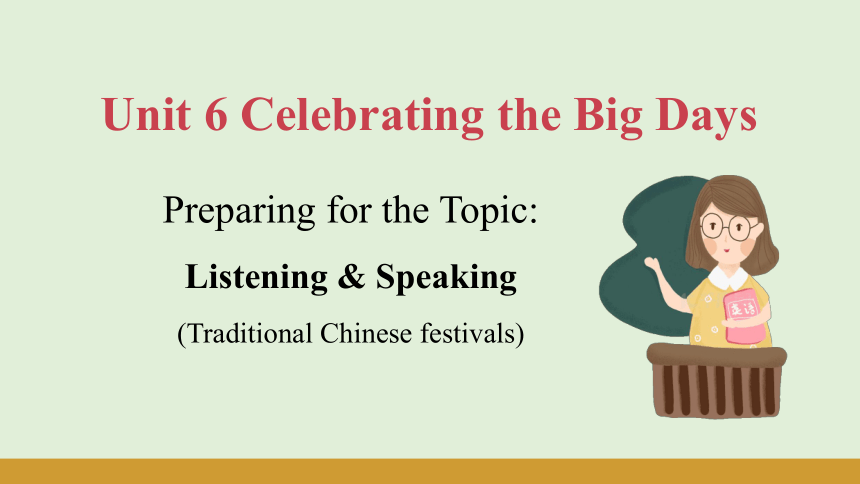 | |
| 格式 | pptx | ||
| 文件大小 | 31.4MB | ||
| 资源类型 | 教案 | ||
| 版本资源 | 仁爱科普版 | ||
| 科目 | 英语 | ||
| 更新时间 | 2024-10-20 15:12:35 | ||
图片预览

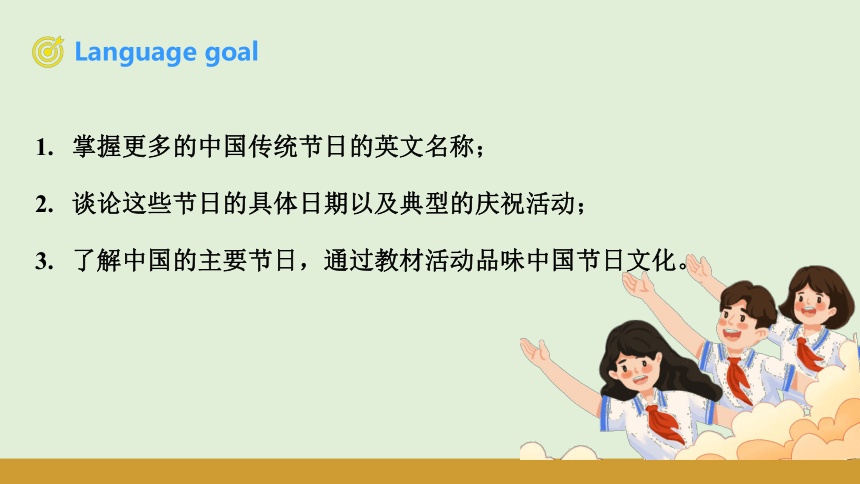
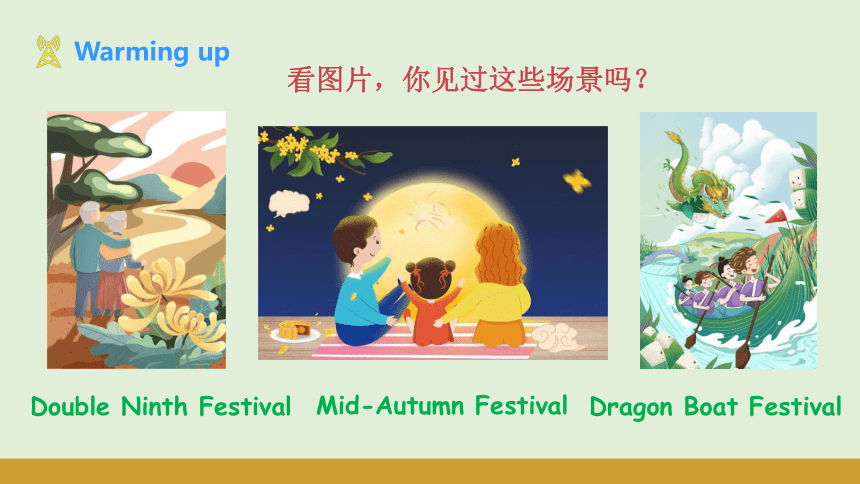
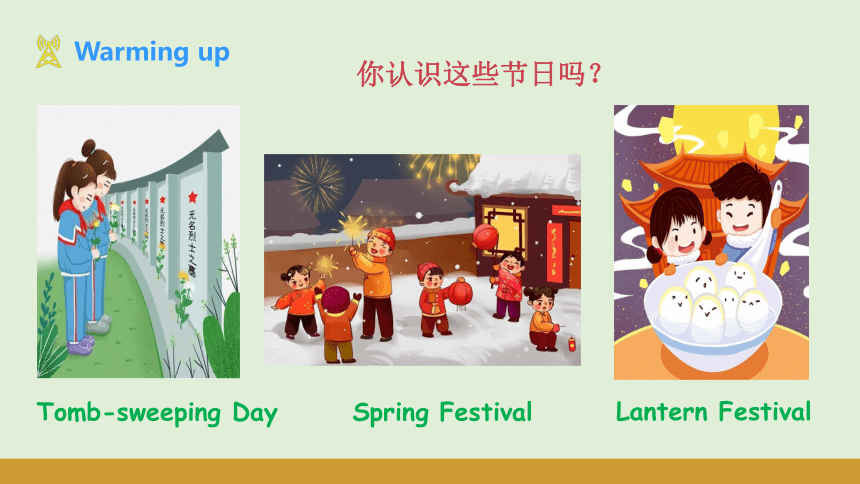
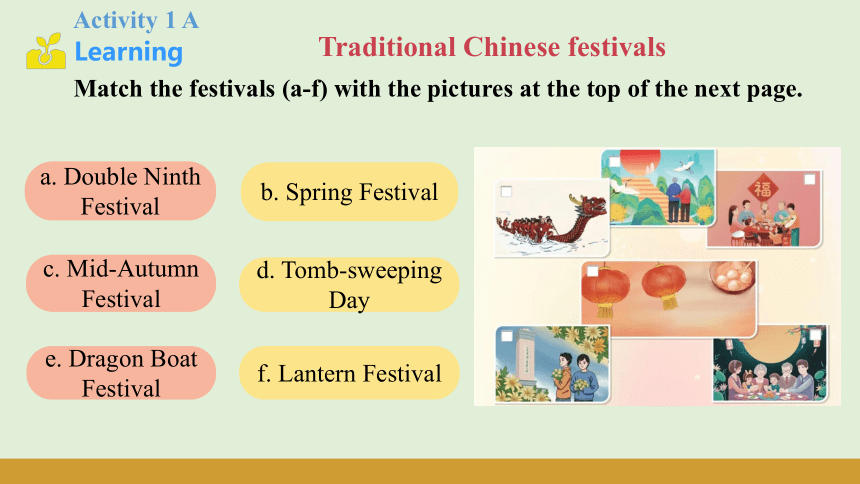
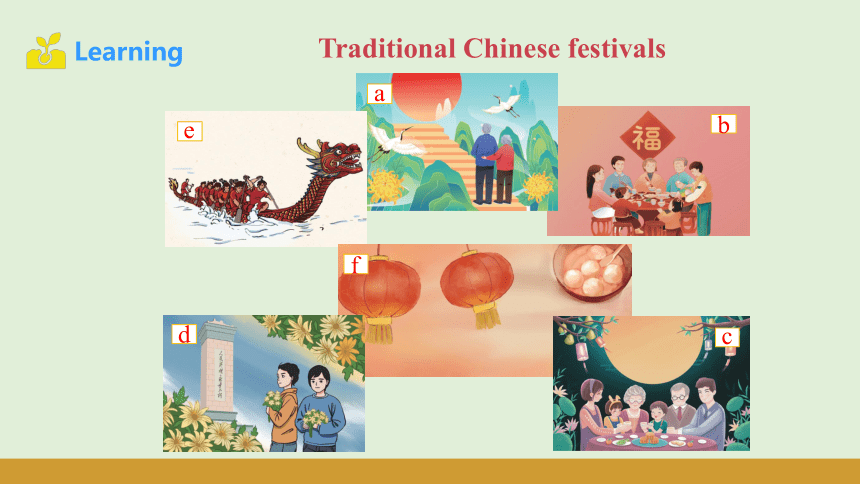
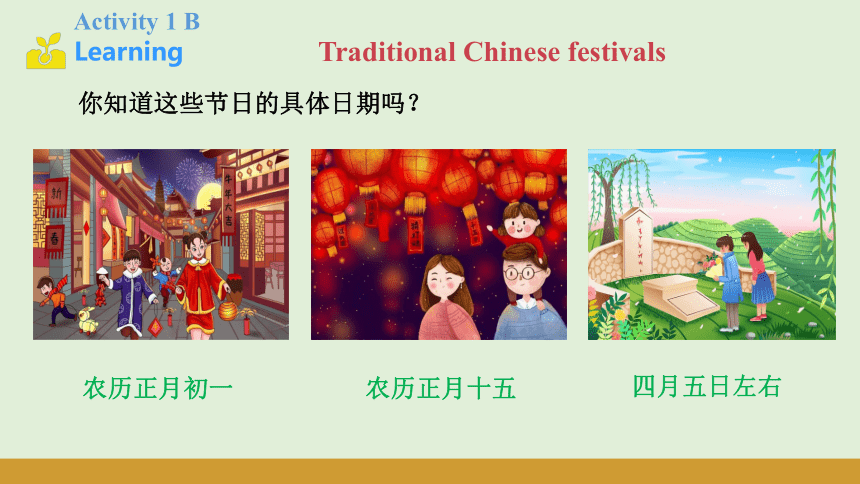
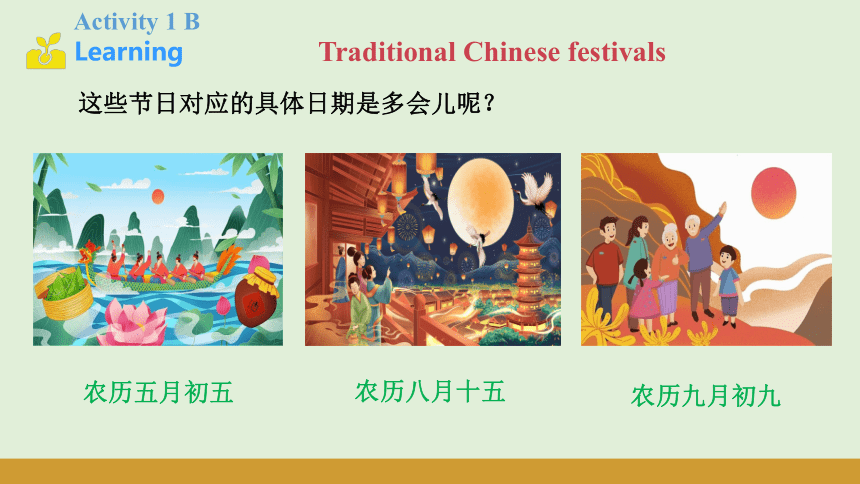
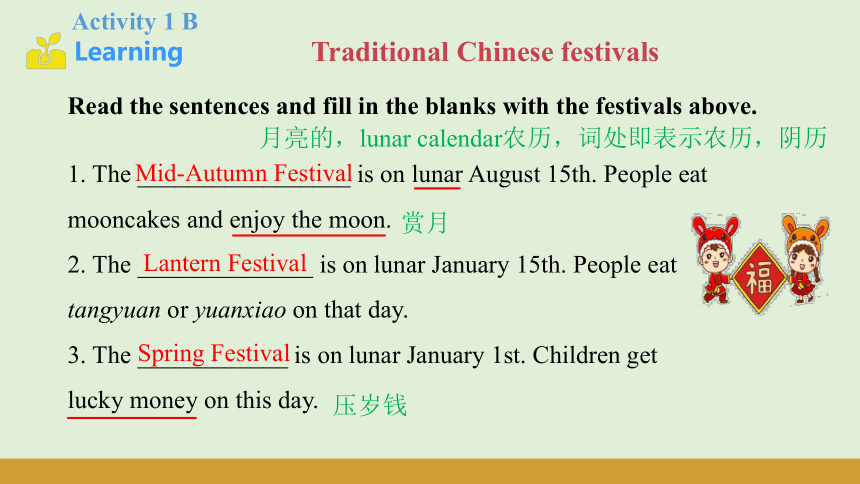
文档简介
(共23张PPT)
Unit 6 Celebrating the Big Days
Preparing for the Topic:
Listening & Speaking
(Traditional Chinese festivals)
掌握更多的中国传统节日的英文名称;
谈论这些节日的具体日期以及典型的庆祝活动;
了解中国的主要节日,通过教材活动品味中国节日文化。
看图片,你见过这些场景吗?
Double Ninth Festival
Mid-Autumn Festival
Dragon Boat Festival
你认识这些节日吗?
Spring Festival
Tomb-sweeping Day
Lantern Festival
Activity 1 A
Match the festivals (a-f) with the pictures at the top of the next page.
Traditional Chinese festivals
a. Double Ninth Festival
b. Spring Festival
c. Mid-Autumn Festival
d. Tomb-sweeping Day
e. Dragon Boat Festival
f. Lantern Festival
Traditional Chinese festivals
a
b
c
d
e
f
Activity 1 B
你知道这些节日的具体日期吗?
农历正月初一
农历正月十五
四月五日左右
Traditional Chinese festivals
农历五月初五
农历八月十五
农历九月初九
这些节日对应的具体日期是多会儿呢?
Traditional Chinese festivals
Activity 1 B
Read the sentences and fill in the blanks with the festivals above.
Activity 1 B
1. The _________________ is on lunar August 15th. People eat mooncakes and enjoy the moon.
2. The ______________ is on lunar January 15th. People eat tangyuan or yuanxiao on that day.
3. The ____________ is on lunar January 1st. Children get
lucky money on this day.
Traditional Chinese festivals
Mid-Autumn Festival
Lantern Festival
Spring Festival
月亮的,lunar calendar农历,词处即表示农历,阴历
赏月
压岁钱
Activity 1 B
Traditional Chinese festivals
Read the sentences and fill in the blanks with the festivals above.
4. Around April 5th, people sweep the tombs of their
late family members on _________________.
5. The _________________ falls on the ninth day of the
ninth lunar month. It is a festival for old people.
6. People usually eat zongzi on the _________________ on lunar May 5th.
Dragon Boat Festival
Tomb-sweeping Day
Double Ninth festival
扫墓
已故的家人
When is the festival
Traditional Chinese festivals
Double Ninth Festival
Mid-Autumn Festival
Dragon Boat Festival
Spring Festival
Tomb-sweeping Day
Lantern Festival
lunar August 15th
lunar January 15th
lunar January 1st
around April 5th
the ninth day of the ninth lunar month
lunar May 5th
阅读短文,从短文后所给的五个选项中选出能填入空白处的最佳选项。
Traditional Chinese festivals
Chongyang Festival is on the ninth day of the ninth lunar month every year. Do you know how it comes 1. ____
Once there was a man called Huan Jing. 2. ____ One day, Fei Changfang tells Huan Jing, “On the ninth day of the ninth lunar month, your parents are going to be ill. You must go home now. 3. ____. Then take the red bags in your hands, and climb up the mountain (爬上山) near your house. You can stay (待) on the mountain until (直到) the next day. Then your parents can be OK.”
4. ____. He asks his family to do all those things. This saves his parents. Huan Jing is very happy.
Many people hear of it. 5. ____. Then it becomes a tradition (传统) now.
A.Make two red bags for your parents and put some
dogwood (山茱萸) in them.
B.They also do those things on this day.
C.Here is a story about it.
D.He learns from his teacher Fei Changfang.
E.Huan Jing listens to his teacher and goes home.
Traditional Chinese festivals
CDAEB
Pair work. Listen and repeat, and then replace the parts in bold and practice with your partner.
Lingling, which months are in summer
Yes. The Dragon Boat Festivals is in June. It falls on the fifth day of the fifth lunar month.
Activity 1 C
Traditional Chinese festivals
June, July and August.
Are there any festivals in these months
Activity 2
Listen to the monolog and fill in the blanks.
Traditional Chinese festivals
May 1st
workers
go traveling
free time
听力文本
Traditional Chinese festivals
May 1st is Labor Day. It is a holiday for workers in the world. On this day, most people like to go traveling with their family and friends, and some people just like to stay at home and enjoy the free time.
Group work. Discuss the activities on different festivals.
Activity 3
Traditional Chinese festivals
A: When is ... B: It’s on ...
A: What do you do on that day B: We ...
dragon boat race
dragon dances
enjoy the moon
Traditional Chinese festivals
Dragon Boat Festival (端午节),端午节与春节、清明节、中秋节并称为中国民间的四大传统节日。节日活动有赛龙舟、端午食粽、挂艾草菖蒲等 。节日饮食:粽子、雄黄酒、五黄等。
zongzi
dragon boat races
Traditional Chinese festivals
The festival is in January or February. Chinese people eat dumplings and perform lion and dragon dances.
春节(Spring Festival)是中华民族最隆重的传统佳节,节日活动有拜年、贴春联、爆竹、耍狮子(perform lion)、舞龙(dragon dances)、发压岁钱等。节日饮食有腊八粥、年糕、饺子(dumplings)、春卷、元宵(sweet dumplings)。
Traditional Chinese festivals
The festival is in lunar January. Chinese people eat sweet dumplings for luck, watch lantern shows and guess riddles on lanterns.
元宵节(Lantern Festival),又称上元节、小正月、元夕或灯节,是春节之后的第一个重要节日。传统习俗有看灯展(watch lantern shows)、燃灯放焰、喜猜灯谜(guess riddles on lanterns)、共吃元宵(汤圆)
(sweet dumplings)、拉兔子灯等。
Traditional Chinese festivals
The festival is in lunar August. People eat mooncakes and enjoy the bright full moon.
中秋节(Mid-Autumn Festival),又称“月夕”、“秋节”、“仲秋节”、“八月节”、“追月节”、“团圆节”,是流行于全国众多民族中的传统文化节日。因其恰值三秋之半,故得此名。据说此夜月亮最大最圆最亮。中秋节自古便有祭月、赏月、吃月饼、看花灯、赏桂花、饮桂花酒等民俗。
1. 结合图片了解了许多种不同的中国传统节日及其具体日期,并能够介绍给同伴或家人;
2. 学习了新的单词和短语,如lunar, enjoy the moon, lucky money, sweep the tombs, late family members等;
3. 通过听说练习,学会了简单地描述不同的节日及其活动,加深了对中国传统文化的理解和名族自豪感。
1. Introduce some Chinese traditional festivals briefly to your family.
2. Finish the exercises of this lesson.
Unit 6 Celebrating the Big Days
Preparing for the Topic:
Listening & Speaking
(Traditional Chinese festivals)
掌握更多的中国传统节日的英文名称;
谈论这些节日的具体日期以及典型的庆祝活动;
了解中国的主要节日,通过教材活动品味中国节日文化。
看图片,你见过这些场景吗?
Double Ninth Festival
Mid-Autumn Festival
Dragon Boat Festival
你认识这些节日吗?
Spring Festival
Tomb-sweeping Day
Lantern Festival
Activity 1 A
Match the festivals (a-f) with the pictures at the top of the next page.
Traditional Chinese festivals
a. Double Ninth Festival
b. Spring Festival
c. Mid-Autumn Festival
d. Tomb-sweeping Day
e. Dragon Boat Festival
f. Lantern Festival
Traditional Chinese festivals
a
b
c
d
e
f
Activity 1 B
你知道这些节日的具体日期吗?
农历正月初一
农历正月十五
四月五日左右
Traditional Chinese festivals
农历五月初五
农历八月十五
农历九月初九
这些节日对应的具体日期是多会儿呢?
Traditional Chinese festivals
Activity 1 B
Read the sentences and fill in the blanks with the festivals above.
Activity 1 B
1. The _________________ is on lunar August 15th. People eat mooncakes and enjoy the moon.
2. The ______________ is on lunar January 15th. People eat tangyuan or yuanxiao on that day.
3. The ____________ is on lunar January 1st. Children get
lucky money on this day.
Traditional Chinese festivals
Mid-Autumn Festival
Lantern Festival
Spring Festival
月亮的,lunar calendar农历,词处即表示农历,阴历
赏月
压岁钱
Activity 1 B
Traditional Chinese festivals
Read the sentences and fill in the blanks with the festivals above.
4. Around April 5th, people sweep the tombs of their
late family members on _________________.
5. The _________________ falls on the ninth day of the
ninth lunar month. It is a festival for old people.
6. People usually eat zongzi on the _________________ on lunar May 5th.
Dragon Boat Festival
Tomb-sweeping Day
Double Ninth festival
扫墓
已故的家人
When is the festival
Traditional Chinese festivals
Double Ninth Festival
Mid-Autumn Festival
Dragon Boat Festival
Spring Festival
Tomb-sweeping Day
Lantern Festival
lunar August 15th
lunar January 15th
lunar January 1st
around April 5th
the ninth day of the ninth lunar month
lunar May 5th
阅读短文,从短文后所给的五个选项中选出能填入空白处的最佳选项。
Traditional Chinese festivals
Chongyang Festival is on the ninth day of the ninth lunar month every year. Do you know how it comes 1. ____
Once there was a man called Huan Jing. 2. ____ One day, Fei Changfang tells Huan Jing, “On the ninth day of the ninth lunar month, your parents are going to be ill. You must go home now. 3. ____. Then take the red bags in your hands, and climb up the mountain (爬上山) near your house. You can stay (待) on the mountain until (直到) the next day. Then your parents can be OK.”
4. ____. He asks his family to do all those things. This saves his parents. Huan Jing is very happy.
Many people hear of it. 5. ____. Then it becomes a tradition (传统) now.
A.Make two red bags for your parents and put some
dogwood (山茱萸) in them.
B.They also do those things on this day.
C.Here is a story about it.
D.He learns from his teacher Fei Changfang.
E.Huan Jing listens to his teacher and goes home.
Traditional Chinese festivals
CDAEB
Pair work. Listen and repeat, and then replace the parts in bold and practice with your partner.
Lingling, which months are in summer
Yes. The Dragon Boat Festivals is in June. It falls on the fifth day of the fifth lunar month.
Activity 1 C
Traditional Chinese festivals
June, July and August.
Are there any festivals in these months
Activity 2
Listen to the monolog and fill in the blanks.
Traditional Chinese festivals
May 1st
workers
go traveling
free time
听力文本
Traditional Chinese festivals
May 1st is Labor Day. It is a holiday for workers in the world. On this day, most people like to go traveling with their family and friends, and some people just like to stay at home and enjoy the free time.
Group work. Discuss the activities on different festivals.
Activity 3
Traditional Chinese festivals
A: When is ... B: It’s on ...
A: What do you do on that day B: We ...
dragon boat race
dragon dances
enjoy the moon
Traditional Chinese festivals
Dragon Boat Festival (端午节),端午节与春节、清明节、中秋节并称为中国民间的四大传统节日。节日活动有赛龙舟、端午食粽、挂艾草菖蒲等 。节日饮食:粽子、雄黄酒、五黄等。
zongzi
dragon boat races
Traditional Chinese festivals
The festival is in January or February. Chinese people eat dumplings and perform lion and dragon dances.
春节(Spring Festival)是中华民族最隆重的传统佳节,节日活动有拜年、贴春联、爆竹、耍狮子(perform lion)、舞龙(dragon dances)、发压岁钱等。节日饮食有腊八粥、年糕、饺子(dumplings)、春卷、元宵(sweet dumplings)。
Traditional Chinese festivals
The festival is in lunar January. Chinese people eat sweet dumplings for luck, watch lantern shows and guess riddles on lanterns.
元宵节(Lantern Festival),又称上元节、小正月、元夕或灯节,是春节之后的第一个重要节日。传统习俗有看灯展(watch lantern shows)、燃灯放焰、喜猜灯谜(guess riddles on lanterns)、共吃元宵(汤圆)
(sweet dumplings)、拉兔子灯等。
Traditional Chinese festivals
The festival is in lunar August. People eat mooncakes and enjoy the bright full moon.
中秋节(Mid-Autumn Festival),又称“月夕”、“秋节”、“仲秋节”、“八月节”、“追月节”、“团圆节”,是流行于全国众多民族中的传统文化节日。因其恰值三秋之半,故得此名。据说此夜月亮最大最圆最亮。中秋节自古便有祭月、赏月、吃月饼、看花灯、赏桂花、饮桂花酒等民俗。
1. 结合图片了解了许多种不同的中国传统节日及其具体日期,并能够介绍给同伴或家人;
2. 学习了新的单词和短语,如lunar, enjoy the moon, lucky money, sweep the tombs, late family members等;
3. 通过听说练习,学会了简单地描述不同的节日及其活动,加深了对中国传统文化的理解和名族自豪感。
1. Introduce some Chinese traditional festivals briefly to your family.
2. Finish the exercises of this lesson.
同课章节目录
